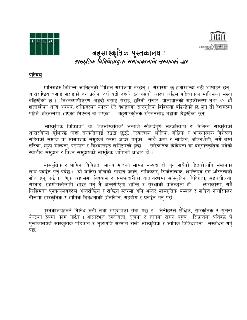Please use this identifier to cite or link to this item:
https://repository.ifla.org/handle/123456789/754Full metadata record
| DC Field | Value | Language |
|---|---|---|
| dc.contributor.author | International Federation of Library Associations and Institutions (IFLA) | - |
| dc.contributor.author | UNESCO | - |
| dc.date.accessioned | 2021-06-14T15:12:10Z | - |
| dc.date.available | 2012-10-17 | - |
| dc.date.available | 2021-06-14T15:12:10Z | - |
| dc.date.issued | 2012-10 | - |
| dc.identifier.uri | https://repository.ifla.org/handle/123456789/754 | - |
| dc.description.abstract | All people live in an increasingly heterogeneous society. There are more than 6,000 different languages in the world. The international migration rate is growing every year resulting in an increasing number of people with complex identities. Globalization, increased migration, faster communication, ease of transportation and other 21st century forces have increased cultural diversity in many nations where it might not have previously existed or has augmented the existing multicultural makeup. “Cultural Diversity” or “Multiculturalism” refers to the harmonious co-existence and interaction of different cultures, where “culture should be regarded as the set of distinctive spiritual, material, intellectual and emotional features of society or a social group, and that it encompasses, in addition to art and literature; lifestyles, ways of living together, value systems, traditions and beliefs”. Cultural diversity or multiculturalism is the foundation of our collective strength in our local communities and in our global society. Cultural and linguistic diversity is the common heritage of humankind and should be cherished and preserved for the benefit of all. It is a source for the exchange, innovation, creativity, and peaceful coexistence among peoples. “Respect for the diversity of cultures, tolerance, dialogue and cooperation, in a climate of mutual trust and understanding are among the best guarantees of international peace and security”. Therefore, libraries of all types should reflect, support and promote cultural and linguistic diversity at the international, national, and local levels, and thus work for cross-cultural dialogue and active citizenship. As libraries serve diverse interests and communities, they function as learning, cultural, and information centres. In addressing cultural and linguistic diversity, library services are driven by their commitment to the principles of fundamental freedoms and equity of access to information and knowledge for all, in the respect of cultural identity and values. | en_US |
| dc.language.iso | ne | en_US |
| dc.publisher | International Federation of Library Associations and Institutions (IFLA) | en_US |
| dc.relation.isversionof | https://repository.ifla.org/handle/123456789/731 | en_US |
| dc.subject | Subject::Library services to multicultural populations | en_US |
| dc.subject | Subject::Multicultural populations | en_US |
| dc.subject | Subject::Multilingualism | en_US |
| dc.subject | Subject::Linguistic diversity | en_US |
| dc.subject | Subject::Linguistic heritage | en_US |
| dc.subject | Subject::Diversity | en_US |
| dc.subject | Subject::UNESCO | en_US |
| dc.title | IFLA/UNESCO बहुसांस्कृतिक पुस्तकालय घोषणापत्र | en_US |
| dc.title.alternative | IFLA/UNESCO Multicultural Library Manifesto: The Multicultural Library – a gateway to a cultural diverse society in dialogue | en_US |
| dc.type | Statements | en_US |
| dc.rights.holder | International Federation of Library Associations and Institutions (IFLA) | en_US |
| dc.audience | Audience::Library Services to Multicultural Populations Section | en_US |
| ifla.oPubId | 9434 | en_US |
| ifla.Unit | Units::Section::Library Services to Multicultural Populations Section | en_US |
| dc.contributor.translator | Kathmandu Valley Public Library | - |
| Appears in Collections: | IFLA Publications | |
Files in This Item:
| File | Description | Size | Format | |
|---|---|---|---|---|
| multicultural_library_manifesto-ne.pdf | IFLA/UNESCO बहुसांस्कृतिक पुस्तकालय घोषणापत्र | 116.45 kB | Adobe PDF |  View/Open |
Items in DSpace are protected by copyright, with all rights reserved, unless otherwise indicated.
